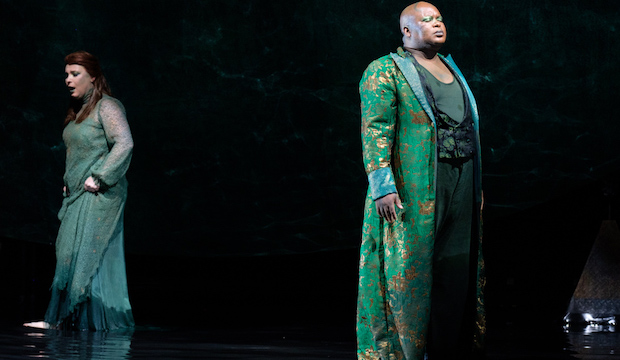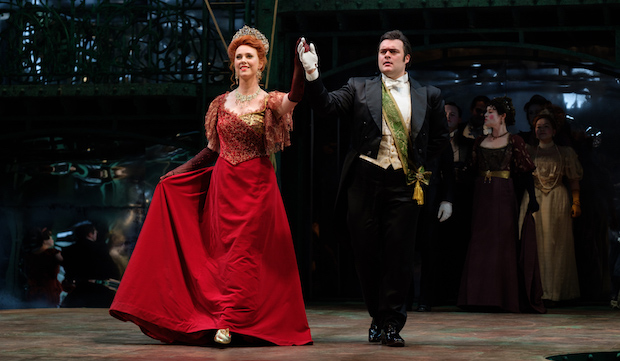Rusalka, Garsington Opera review ★★★★★
Natalya Romaniw excels in the title role of Dvorak's painful opera. Now to catch her in Tosca...
The human world is airborne in Rusalka at Garsington. Photo: Luca Migliore
Rusalka, the tale of a water-spirit who falls in love with a human prince, is the ninth of 10 operas written by Antonín Dvořák, but the only one regularly performed outside the Czech Republic.
The main problem in staging this work is how to present two separate worlds – the watery world of Rusalka and the human world of the Prince – but it’s a problem which director, Jack Furness, and designer, Tom Piper, have solved brilliantly. A huge wooden platform occupies most of the stage. When raised, it reveals a pool of water underneath which lighting designer, Malcolm Rippeth, uses to bounce dappled light onto the underside of the platform: when lowered, it becomes the dull earthen floor of the human world. A circle cut in the platform provides the wormhole that allows Rusalka to move between the two mutually-exclusive dimensions.
The forest around the lake is inhabited by wood-nymphs, Puck-like creatures with impish horns, played by aerialists performing circus tricks high above a stage which is messily strewn with enough ropes to rig the Cutty Sark. A Victorian-looking wrought iron gallery across the back of the stage represents the Prince’s domain and kudos must go to the technical director, Steve Hawkins, and the Garsington stage crew for the faultless performance of an extremely complicated set.

Natalya Romaniw is glorious as Rusalka, defiantly heading for the human world. Photo: Luca Migliore
Rusalka, in a glorious performance by Welsh soprano, Natalya Romaniw, is so desperate to be united with the Prince that she persuades the witch Ježibaba (Christine Rice, relishing the challenging vocal demands of this rôle) to give her a potion that will make her human. Ježibaba warns her that the potion will not only make her mute but that, if the Prince rejects her love, both of them will be damned. Rusalka accepts, the Prince falls in love at first sight and, as the curtains which block the sun from coming through the glass walls of the Garsington theatre are drawn aside, Rusalka and the Prince walk off into a real-life sunset.
In Act Two, the Prince, played by the Austrian-Australian tenor, Gerard Schneider, becomes bored with Rusalka and our spirits dropped as Furness’s direction became desperately literal. The set is hung with deer carcasses – Rusalka is not the only catch the Prince has brought back from the forest – and Schneider enters in a blood-spattered apron and rips the heart from a carcass before our eyes.
A Foreign Princess has arrived at court but it is not her witty conversation that distracts the Prince from the mute Rusalka but, in Furness’s interpretation, the fact that she lifts her dress to invite the Prince for an aggressive and prolonged grope between her legs.
Fortunately, things improved enormously in Act Three as Rusalka sadly returns to the lake. Perhaps trained by Lina Johansson, the choregrapher for the circus performers, the singing wood-nymphs, Marlena Devoe (whose silvery soprano is particularly beautiful), Heather Lowe and Stephanie Wake-Edwards, not only sang and blended lusciously together but insouciantly delivered their solos from swings in mid-air, swings created out of nothing by the acrobats simply twisting a few ropes together. Even Romaniw fearlessly shows off her circus skills, lying horizontally and spinning wildly as she is lowered on ropes into the lake.

A Foreign Princess distracts Rusalka's lover (Gerard Schneider). Photo: Luca Migliore
The Prince appears to beg Rusalka’s forgiveness and the conductor, Douglas Boyd, whose tempi in Act One were languorous to the point of stasis, drew ravishing sounds from the Philharmonia Orchestra in the glorious final love duet. Schneider’s velvety tenor was occasionally put under strain by some of the more Wagnerian moments in the score but he produced phrases of limpid beauty as he begs for the final kiss that will end his life, dying in Rusalka’s arms.
Romaniw, tireless throughout the evening, produced wave after wave of golden singing and received a huge ovation from the audience. She makes her debut at the Royal Opera House in December as Tosca (12, 15, 18 and 21 Dec), opposite the hot tenor of the moment, Freddie de Tommaso. Booking opens on 27 July. Make a note in your diary now.
The main problem in staging this work is how to present two separate worlds – the watery world of Rusalka and the human world of the Prince – but it’s a problem which director, Jack Furness, and designer, Tom Piper, have solved brilliantly. A huge wooden platform occupies most of the stage. When raised, it reveals a pool of water underneath which lighting designer, Malcolm Rippeth, uses to bounce dappled light onto the underside of the platform: when lowered, it becomes the dull earthen floor of the human world. A circle cut in the platform provides the wormhole that allows Rusalka to move between the two mutually-exclusive dimensions.
The forest around the lake is inhabited by wood-nymphs, Puck-like creatures with impish horns, played by aerialists performing circus tricks high above a stage which is messily strewn with enough ropes to rig the Cutty Sark. A Victorian-looking wrought iron gallery across the back of the stage represents the Prince’s domain and kudos must go to the technical director, Steve Hawkins, and the Garsington stage crew for the faultless performance of an extremely complicated set.

Natalya Romaniw is glorious as Rusalka, defiantly heading for the human world. Photo: Luca Migliore
Rusalka, in a glorious performance by Welsh soprano, Natalya Romaniw, is so desperate to be united with the Prince that she persuades the witch Ježibaba (Christine Rice, relishing the challenging vocal demands of this rôle) to give her a potion that will make her human. Ježibaba warns her that the potion will not only make her mute but that, if the Prince rejects her love, both of them will be damned. Rusalka accepts, the Prince falls in love at first sight and, as the curtains which block the sun from coming through the glass walls of the Garsington theatre are drawn aside, Rusalka and the Prince walk off into a real-life sunset.
In Act Two, the Prince, played by the Austrian-Australian tenor, Gerard Schneider, becomes bored with Rusalka and our spirits dropped as Furness’s direction became desperately literal. The set is hung with deer carcasses – Rusalka is not the only catch the Prince has brought back from the forest – and Schneider enters in a blood-spattered apron and rips the heart from a carcass before our eyes.
A Foreign Princess has arrived at court but it is not her witty conversation that distracts the Prince from the mute Rusalka but, in Furness’s interpretation, the fact that she lifts her dress to invite the Prince for an aggressive and prolonged grope between her legs.
Fortunately, things improved enormously in Act Three as Rusalka sadly returns to the lake. Perhaps trained by Lina Johansson, the choregrapher for the circus performers, the singing wood-nymphs, Marlena Devoe (whose silvery soprano is particularly beautiful), Heather Lowe and Stephanie Wake-Edwards, not only sang and blended lusciously together but insouciantly delivered their solos from swings in mid-air, swings created out of nothing by the acrobats simply twisting a few ropes together. Even Romaniw fearlessly shows off her circus skills, lying horizontally and spinning wildly as she is lowered on ropes into the lake.

A Foreign Princess distracts Rusalka's lover (Gerard Schneider). Photo: Luca Migliore
The Prince appears to beg Rusalka’s forgiveness and the conductor, Douglas Boyd, whose tempi in Act One were languorous to the point of stasis, drew ravishing sounds from the Philharmonia Orchestra in the glorious final love duet. Schneider’s velvety tenor was occasionally put under strain by some of the more Wagnerian moments in the score but he produced phrases of limpid beauty as he begs for the final kiss that will end his life, dying in Rusalka’s arms.
Romaniw, tireless throughout the evening, produced wave after wave of golden singing and received a huge ovation from the audience. She makes her debut at the Royal Opera House in December as Tosca (12, 15, 18 and 21 Dec), opposite the hot tenor of the moment, Freddie de Tommaso. Booking opens on 27 July. Make a note in your diary now.
TRY CULTURE WHISPER
Receive free tickets & insider tips to unlock the best of London — direct to your inbox
| What | Rusalka, Garsington Opera review |
| Where | Garsington Opera, Wormsley Estate , Stokenchurch, HP14 3YG | MAP |
| Nearest tube | Marylebone (underground) |
| When |
18 Jun 22 – 19 Jul 22, 12:00 AM |
| Price | £Booking closed |
| Website | Click here for more information |